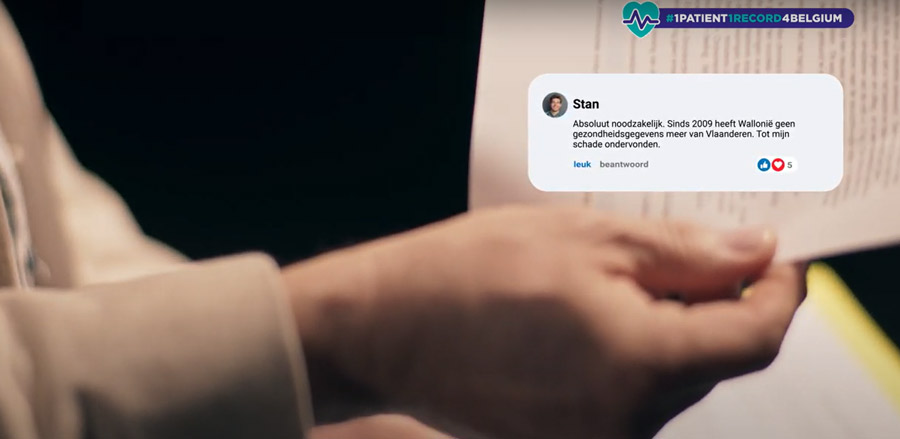5 testimonials from the community that show why change is needed
The #1Patient1Record4Belgium community allows everyone in the healthcare industry – from providers to patients – to come together to share ideas, opinions and questions about medical data. We stand for transparency in healthcare. And we are not there yet today. The stories we receive every day are testament to that.

Be part of the community
With your help, we’re committed to unlocking your data, making sure all information is available where and when it’s needed, no matter where it comes from. This is important, because even today, allergic reactions occur because of incorrect medication prescriptions. People get sick because of improper treatment.
In our community, we receive many such stories. In this article you will read 5 experiences that we wanted to share with you. We are grateful to them because their voice – like yours – is incredibly important. Only together can we achieve our goal.
1. Lotte, caregiver, lacks a lot of information
Lotte: “I often make home visits to vulnerable people. This includes people with mental health issues, the chronically ill and the elderly. Many of my patients are on medication, but because of privacy laws, I often don’t know what their diagnoses or medication regimens are.
This would actually help me make contact with the general practitioner, psychiatrist or other professionals more easily. As a social worker, I want to support my clients in as many ways as possible and, in my opinion, medical information should not be excluded and availbale for me to help my patients. Valuable time is currently lost in counseling, often due to unsuccessful attempts to make contact (think of medical services and hospitals that are unreachable).”
In order to support my patients as broadly as possible, in my opinion, medical information should not be excluded from my scope.
Lotte, Caregiver
2. As a caregiver, Daniella notes that she is not always consulted
Daniella’s mother is very old and very helpless. “Last year, she wrote down her wishes regarding her will, end of life and euthanasia issues. Yet during a recent hospitalization, it became apparent that health care providers wanted to perform tests that her mother already no longer wanted. “She was also asked again if she wanted to be resuscitated or taken to intensive care if necessary.
It turned out that my mother’s documents are not available electronically. Fortunately, I am here. And I know her wishes. But it is becoming increasingly clear that as an “informal caregiver” I am not being consulted. Basically, people do what they want…”
3. Corneel is elderly and doesn’t know how to get his data
“Honestly, I don’t know how to get my medical records or where to find them. My primary care physician has my comprehensive medical record (CMR), but I don’t know what exactly is in it. Also, these days you can only take 15 minutes to ask a few questions about your health or the health of your loved ones. I’m 84, my wife is 83 and we have a medical history. I would like to be informed about it.”
Honestly, I don’t know how to get my medical records or where to find them.
Corneel
4. Julian’s record was changed
Whether it’s prescribing the wrong medication or submitting the wrong treatment, fragmented medical information can cause a lot of errors. Juliaan noticed this as well. “When I went to the doctor for my hip, he recommended I have surgery. I didn’t agree, because there was a good chance I would become paralyzed. Eventually, the proposed surgery turned out to be a misunderstanding…”
The nurse had confused my chart with another patient’s. This was done with a paper file.
Juliaan, patient
5. Information is not updated in a timely manner
After an operation, Lily-May discovered that after a year, the doctors had not reported on the operation. “It’s very serious, because as soon as you come back to the hospital – for whatever reason – they don’t know anything about the most recent surgery.
Want to share your experience and story? You can do so in the comments below here, (anonymously) via the button on the website or (anonymously) in our Facebook community.




Leave a Reply